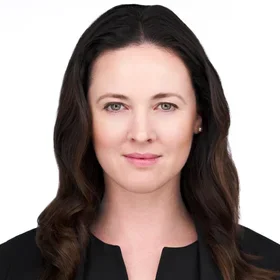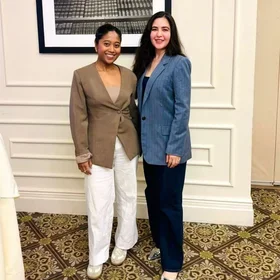Naureen Aziz- Wani, ’20SPS, Information Knowledge and Strategy, started her career in the world of public health. With an M.Sc. in Health Sciences she found herself, almost by happenstance, working in information and knowledge management for public health programs. She started her career at the Latin American and Caribbean regional office of the World Health Organization. Today, Naureen works at a development organization as an External Affairs professional. While leading the communications strategy for a newly-established knowledge management department at the World Bank she decided she wanted to professionalize her years of experience with a Master’s in Information Knowledge and Strategy at Columbia University’s School of Professional Studies.
“This program helps you build concrete skills and learn techniques that can help you capitalize on your strengths in the marketplace.” Naureen said of the program, which she started in the fall of 2019.
She sat down with us to give a little more insight into how the IKNS coursework is helping her continue to grow and advance her professional goals:
What were you doing before joining the IKNS program?
Before joining the IKNS program, I was part of a team in charge of developing and implementing a knowledge management action plan for the Bank, an initiative that started in 2017. The Bank has a long history in knowledge management, but this was meant to harmonize and centralize some of what we are doing across the organization.
What drew you to Columbia’s IKNS degree?
Of course, Columbia University’s name and quality of education here, the prestige and stature of the university. In the past, I had worked with Kate Pugh [IKNS faculty], who was doing some work for the World Bank back then. Through her, I got to know about the program and it felt exactly what I needed to enhance my skills.
Given my role and the time I spent with the group it got me more curious. I thought ‘Maybe this is a good time for me to build on this learning and knowledge I have gathered over a number of years.’
How do you explain IKNS to someone who doesn’t understand your field of work?
The way I look at it is that organizations have always relied on information, knowledge and data to make better decisions and to inform the work that they do. Some organizations have come far along on this journey and mastered this art and some are in the early phases and are trying to figure out what it means to effectively use the knowledge they generate.
IKNS is really about leveraging data, information and knowledge, drawing insights from it, and then feeding it back into your core business for greater impact.
If you’ve worked at the intersection of information, data, and knowledge and you’ve enjoyed it, there is certainly value in solidifying that understanding for yourself and strengthening your capabilities through a solid academic program. This program allows you to identify and pinpoint the leadership skills you really need to excel in the space.
—Naureen Aziz-Wani, ’20SPS, M.S. in Information and Knowledge Strategy
What have been some of the highlights of the program for you?
I’m really loving this Digital Product Innovation and Entrepreneurship course. It teaches you innovation knowledge and skills about design and development of digital products. It helps you see things as an entrepreneur, makes you think with an open mind, understand patterns and, identify opportunities. What I am appreciating the most, is the emphasis on continuous improvement in a product to ensure it meets the needs of the user.
The beauty of the program that I’m seeing is that there is a good balance of identifying and teaching the soft skills - the behavioral elements, the psychology of things, how the mind works, how people work - which are absolutely critical. It really teaches you to tap into your own emotional intelligence and leadership qualities, but on the flipside, it enhances your technical knowledge and skills in a way that would not otherwise be possible. The classes like Leading Business Analytics for Enterprise are excellent and teach you so much about the role of data analytics and how that can drive business outcomes.
The Leading Collaboration class is really good too. It really makes you look at collaboration in a different way. While a lot of it is art, there is also real science to it, based on extensive research, it isn’t just “let’s work together.”
Experts talk about the idea of businesses upskilling and reskilling employees, but what about collective knowledge inside the organization. Why do you think it is important for businesses to leverage that?
As long as knowledge is relevant, it is important to leverage it. Especially in the World Bank’s context, there’s so much knowledge generated every single day just at an operational level. There are constantly lessons that are learned, innovative ways of doing things, new findings, and emerging research and because the organization is so big, a lot of that gets lost. People working in operations need to know about these findings rather than reinventing the wheel or sometimes making the same mistakes. The flow of knowledge is critical within an organization. As knowledge is generated it feeds back into the loop and benefits everyone across the organization.
In this day and age, as organizations are working across boundaries and geographic locations, across sectors and teams, and with everything being so integrated, it is important that you know what is out there. You’d be a fool to claim that you have all the knowledge you need to help the organization operate. The most interesting insights are often from the people furthest removed from you. You want to bring that different thinking together. Inside knowledge sharing is critical but external knowledge sharing is equally important.
What kind of advice do you have for students that may be considering the program?
If you’ve worked at the intersection of information, data, and knowledge and you’ve enjoyed it, there is certainly value in solidifying that understanding for yourself and strengthening your capabilities through a solid academic program. The [M.S. in Information and Knowledge Strategy] program at Columbia allows you to identify and pinpoint the leadership skills you really need to excel in the space.
The good thing about the program is that it exposes you to such a wealth of knowledge and a broad network of connections. So far I’ve had four or five classes and every time I come to Columbia, I just hear from these fascinating people...some of them alumni of the IKNS program. It would be impossible to even know about those resources without being in the program, let alone have direct access to them through this network.


